外研版(2019)必修 第一册Unit 1 A new start Understanding ideas Language points课件(共28张PPT)
文档属性
| 名称 | 外研版(2019)必修 第一册Unit 1 A new start Understanding ideas Language points课件(共28张PPT) | 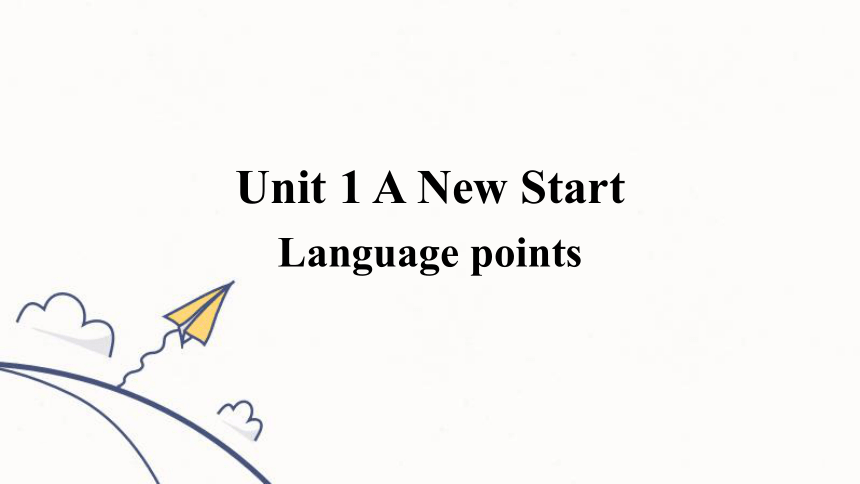 | |
| 格式 | pptx | ||
| 文件大小 | 403.9KB | ||
| 资源类型 | 教案 | ||
| 版本资源 | 外研版(2019) | ||
| 科目 | 英语 | ||
| 更新时间 | 2024-10-10 16:34:23 | ||
图片预览

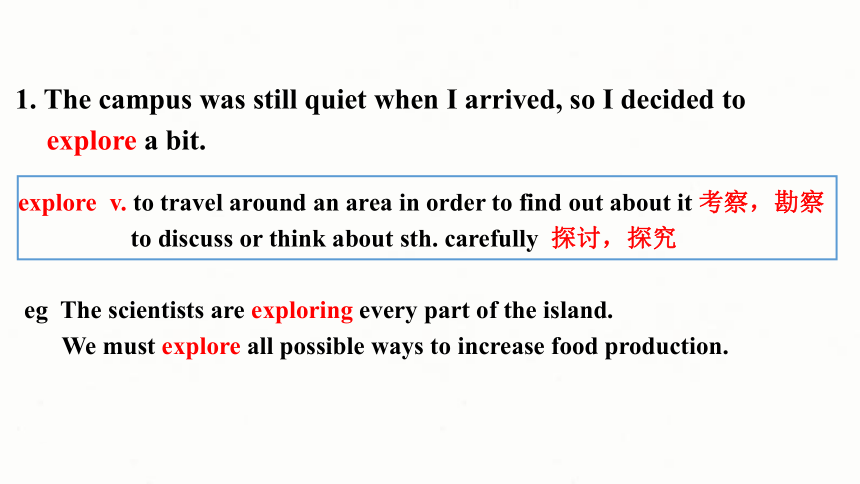
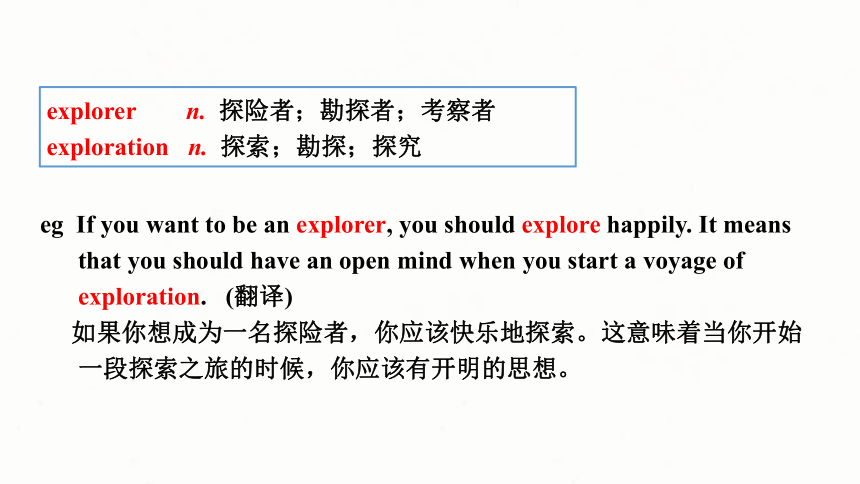
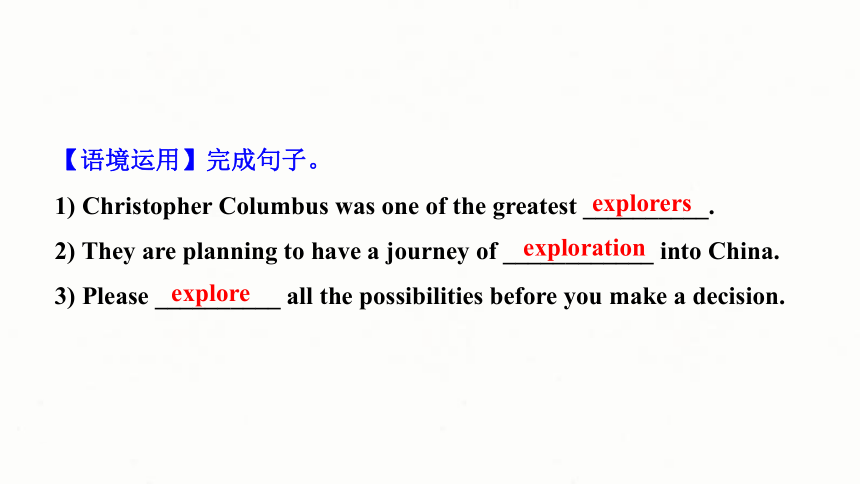
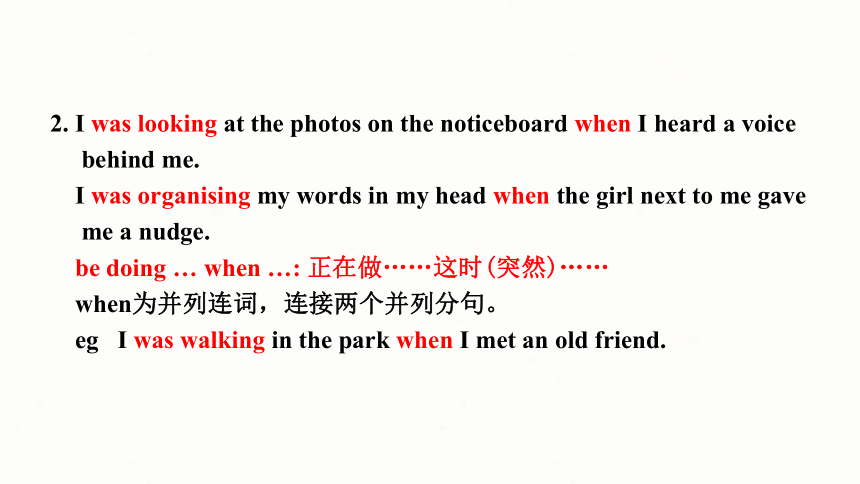
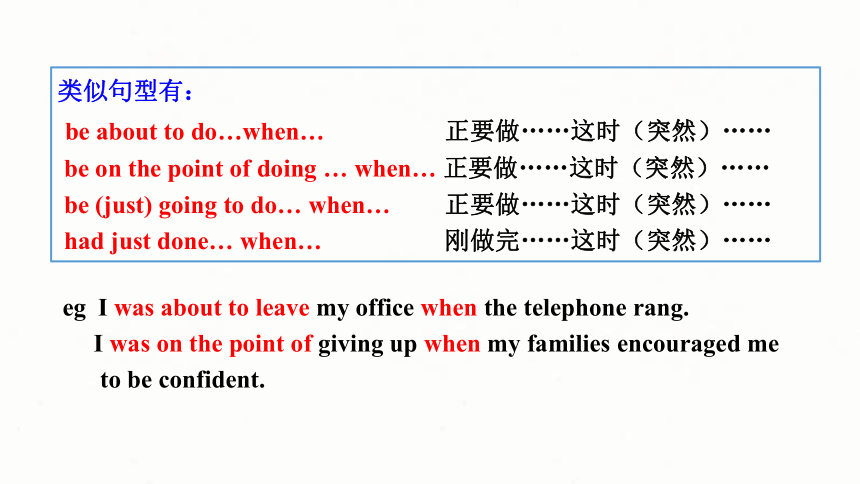
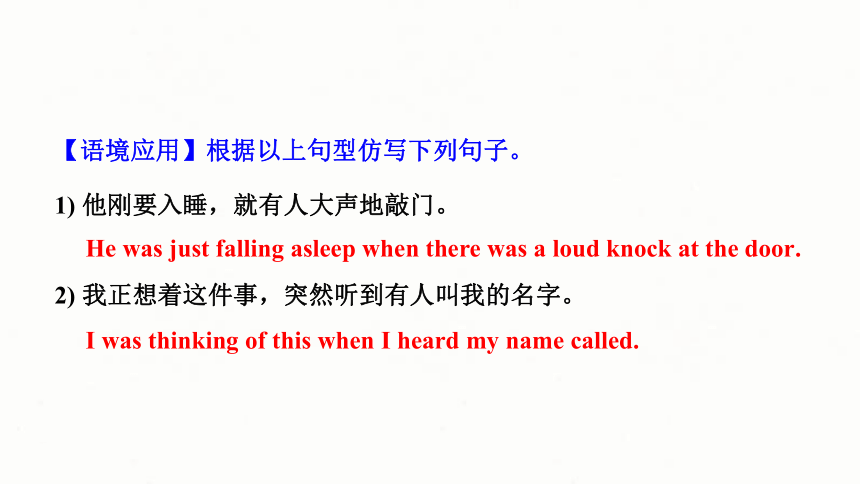
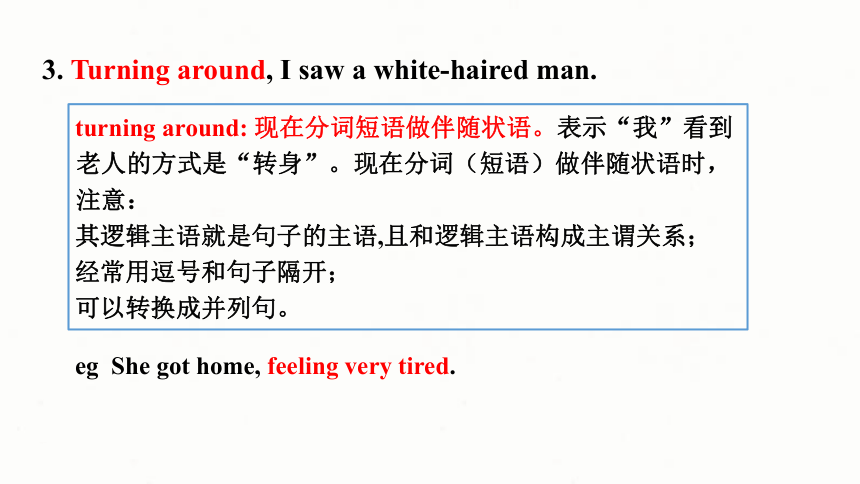
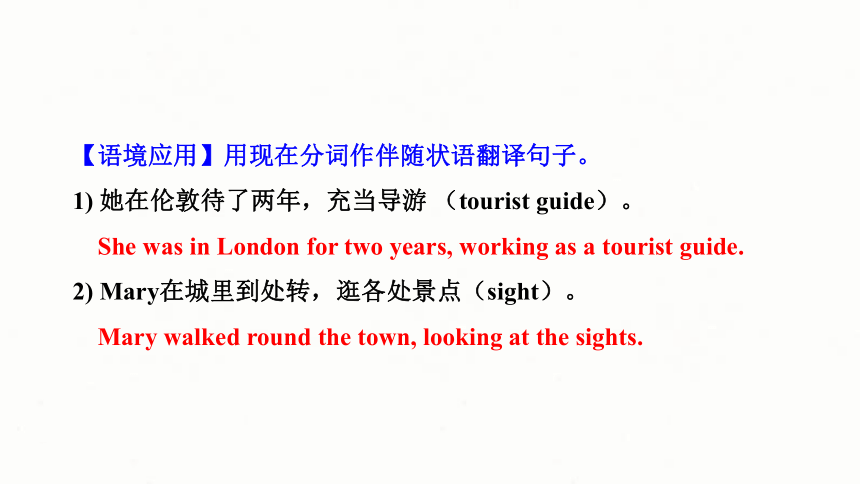
文档简介
(共28张PPT)
Unit 1 A New Start
Language points
1. The campus was still quiet when I arrived, so I decided to explore a bit.
explore v. to travel around an area in order to find out about it 考察,勘察
to discuss or think about sth. carefully 探讨,探究
eg The scientists are exploring every part of the island.
We must explore all possible ways to increase food production.
eg If you want to be an explorer, you should explore happily. It means that you should have an open mind when you start a voyage of exploration. (翻译)
如果你想成为一名探险者,你应该快乐地探索。这意味着当你开始一段探索之旅的时候,你应该有开明的思想。
explorer n. 探险者;勘探者;考察者
exploration n. 探索;勘探;探究
【语境运用】完成句子。
1) Christopher Columbus was one of the greatest __________.
2) They are planning to have a journey of ____________ into China.
3) Please __________ all the possibilities before you make a decision.
explorers
exploration
explore
2. I was looking at the photos on the noticeboard when I heard a voice behind me.
I was organising my words in my head when the girl next to me gave me a nudge.
be doing … when …: 正在做……这时(突然)……
when为并列连词,连接两个并列分句。
eg I was walking in the park when I met an old friend.
eg I was about to leave my office when the telephone rang.
I was on the point of giving up when my families encouraged me to be confident.
类似句型有:
be about to do…when… 正要做……这时(突然)……
be on the point of doing … when… 正要做……这时(突然)……
be (just) going to do… when… 正要做……这时(突然)……
had just done… when… 刚做完……这时(突然)……
【语境应用】根据以上句型仿写下列句子。
1) 他刚要入睡,就有人大声地敲门。
2) 我正想着这件事,突然听到有人叫我的名字。
He was just falling asleep when there was a loud knock at the door.
I was thinking of this when I heard my name called.
3. Turning around, I saw a white-haired man.
turning around: 现在分词短语做伴随状语。表示“我”看到老人的方式是“转身”。现在分词(短语)做伴随状语时,注意:
其逻辑主语就是句子的主语,且和逻辑主语构成主谓关系;
经常用逗号和句子隔开;
可以转换成并列句。
eg She got home, feeling very tired.
【语境应用】用现在分词作伴随状语翻译句子。
1) 她在伦敦待了两年,充当导游 (tourist guide)。
She was in London for two years, working as a tourist guide.
2) Mary在城里到处转,逛各处景点(sight)。
Mary walked round the town, looking at the sights.
4. With butterflies in my stomach, I breathed deeply.
butterflies in one’s stomach: a feeling of being very nervous
情绪紧张,心里发慌
eg I always get butterflies in my stomach before an exam.
The rhetorical device used in the sentence is simile (明喻). Simile is a comparison between two distinctly different things. For example: The old man’s hair is as white as snow.
【语境应用】翻译句子。
1) When I heard my name called, I was getting butterflies in my stomach.
当我听到有人叫我的名字时,我十分紧张。
2) When you have butterflies in your stomach, try taking a deep breath. It should help.
当你感到紧张的时候,你不妨深呼吸一下,这很有效。
With butterflies in my stomach, I breathed deeply. (翻译)
我感到极度紧张,做了一个深呼吸。
with butterflies in my stomach是“with+宾语+宾语补足语”结构。
宾语部分往往是名词或代词。
宾语补足语可以是名词、形容词、介词短语、副词、动词-ing形式(表主动进行)、动词-ed形式(表被动完成)、不定式(表将来)等。
这种结构常在句中用作状语,表示原因、时间、条件、伴随、方式等,有时也可作定语。
1) with+宾语+宾语补足语 (形容词)
eg He is used to sleeping with the windows open.
2) with+宾语+宾语补足语 (副词)
eg He stood before his teacher with his head down.
3) with+宾语+宾语补足语 (介词短语)
eg Our teacher came in with a book in his hand.
4) with+宾语+宾语补足语 (to do, 表动作尚未进行)
eg With a local guide to lead the way, we’ll be able to find the village easily.
5) with+宾语+宾语补足语 (doing, 表主动或正在进行)
eg The children looked at us, with their eyes opening wide.
6) with+宾语+宾语补足语 (done, 表被动或完成)
eg With his homework done, he went out to play.
【语境应用】翻译句子。
1) 他头枕着胳膊睡着了。
2) 有这么多盘子要洗,我不能出去了。
He was asleep with his head on his arms.
I can’t go out with so many dishes to wash.
5. Everyone started laughing. I looked at them in panic.
eg Carmel was in panic about her exam.
He got into a panic that he would forget his lines on stage.
There's no panic, we've got plenty of time.
There was a panic when the fire broke out.
panic n. a sudden strong feeling of fear or nervousness
惊慌,惊恐
in panic 感到惊慌
get into a panic 惊慌失措
there’s no panic 用不着惊慌
panic v. to suddenly feel so frightened that you cannot think clearly or behave sensibly, or to make someone do this
(使)惊慌,恐慌
panic …into doing sth. 使某人仓促行事
注意其动词变形:panicking, panicked
eg The sound of gunfire panicked the crowd.
The children panicked when they realized they were lost.
【语境应用】完成句子。
1) 我发觉门锁上了,十分惊慌。
I ______ ______ ______ ______ when I found the door was locked.
2) 不要惊慌!一切都会没事的。
_______ _______! Everything will be okay.
3) 迈克惊恐地跳出了那辆车。
Mike jumped out of the car ______ ______.
got into a panic
Don’t panic
in panic
6. Challenges like this might sometimes put you under pressure.
eg To cross this dangerous river was a challenge to most of us.
Martins now faces the biggest challenge of his career.
The company is ready to meet the challenges of the next few years.
challenge n. something that tests strength, skill, or ability, especially in a way that is interesting 挑战,具有挑战性的事物
face a challenge 面临挑战 accept a challenge 接受挑战
meet the challenge of 迎接……的挑战
challenge v. tries to win something or invites someone to try to beat them in a fight, competition etc. 向……挑战;
question sth. their truth, value, or authority 对……怀疑
eg They had challenged and beaten the best team in the world.
Jane challenged her grandfather on his old-fashioned views.
pressure n. a difficult situation that makes you feel worried or unhappy 压力
the force you produce when you press something 压力
the force that a liquid or gas produces when it presses against an area(液体或气体产生的)压力
under pressure 在压力下 (注意:无冠词)
under the pressure of 在……的压力下
put / bring pressure on sb. 给某人施加压力
reduce / relieve pressure on sb. / sth. 减轻压力
blood pressure 血压
eg the pressures of work
Can you work well under pressure
He may have put pressure on her to agree.
Your blood pressure is too high.
7. But it all depends on what you do.
depend on: if something depends on something else, it is directly affected or decided by that thing 取决于
to need the support, help, or existence of someone or something in order to exist, be healthy, be successful etc. 依靠,依赖
to trust or have confidence in someone or something 信赖,相信
eg Whether we will go there depends on the weather.
We depend on the Internet for daily news.
Just depend on me. I'll be able to lead you there.
【语境应用】翻译句子。
1) All living things depend on the sun for their growth.
万物生长靠太阳。
2) How much it costs depends on how much you buy.
花多少钱取决于你买多少东西。
8. That way, you’ll make the most of your time at senior high.
eg It’s a beautiful day. We should make the most of it.
The exam is coming near. You should make the most of your time.
make the most of: to gain the greatest possible advantage from sth. 充分利用,尽量利用
eg Mother tells me that I should make good use of time.
No matter what the result is, we should make full use of this chance.
make good use of = make the best of 好好利用
make (full) use of (充分)利用
【语境应用】 翻译句子。
1) 王先生利用一切机会学习英语。
Mr Wang makes the most / good use / (full) use of his chance to learn English.
2) 虽然生命过于短暂,但是如果我们能好好地利用它,我们就没什么遗憾了。
Life is too short, but if we can make the most / good use / (full) use of it, we shall have no regrets.
9. With the English teacher’s support, he thought senior high was easy and felt confident about his future.
confident adj. sure that you have the ability to do things well or deal with situations successfully 有信心的,自信的
be confident of / in / about, be confident that 对……有信心
eg I’m confident about the exam.
It was a confident performance.
One has to be confident in himself.
I’m confident that you will get the job.
confidence n. 信心;信任
have confidence in 对……有信心
lack confidence in 对……缺乏信心
eg We have every confidence in your ability.
She is a good student but she lacks confidence in herself.
Louis, a confident dancer, has confidence in give a good performance and confident of winning the first prize in the competition.
【语境应用】翻译句子。
1) 他对未来充满信心。
2) 队员都信赖他们的教练。
He is confident of / about the future.
The players all have confidence in their coach.
Unit 1 A New Start
Language points
1. The campus was still quiet when I arrived, so I decided to explore a bit.
explore v. to travel around an area in order to find out about it 考察,勘察
to discuss or think about sth. carefully 探讨,探究
eg The scientists are exploring every part of the island.
We must explore all possible ways to increase food production.
eg If you want to be an explorer, you should explore happily. It means that you should have an open mind when you start a voyage of exploration. (翻译)
如果你想成为一名探险者,你应该快乐地探索。这意味着当你开始一段探索之旅的时候,你应该有开明的思想。
explorer n. 探险者;勘探者;考察者
exploration n. 探索;勘探;探究
【语境运用】完成句子。
1) Christopher Columbus was one of the greatest __________.
2) They are planning to have a journey of ____________ into China.
3) Please __________ all the possibilities before you make a decision.
explorers
exploration
explore
2. I was looking at the photos on the noticeboard when I heard a voice behind me.
I was organising my words in my head when the girl next to me gave me a nudge.
be doing … when …: 正在做……这时(突然)……
when为并列连词,连接两个并列分句。
eg I was walking in the park when I met an old friend.
eg I was about to leave my office when the telephone rang.
I was on the point of giving up when my families encouraged me to be confident.
类似句型有:
be about to do…when… 正要做……这时(突然)……
be on the point of doing … when… 正要做……这时(突然)……
be (just) going to do… when… 正要做……这时(突然)……
had just done… when… 刚做完……这时(突然)……
【语境应用】根据以上句型仿写下列句子。
1) 他刚要入睡,就有人大声地敲门。
2) 我正想着这件事,突然听到有人叫我的名字。
He was just falling asleep when there was a loud knock at the door.
I was thinking of this when I heard my name called.
3. Turning around, I saw a white-haired man.
turning around: 现在分词短语做伴随状语。表示“我”看到老人的方式是“转身”。现在分词(短语)做伴随状语时,注意:
其逻辑主语就是句子的主语,且和逻辑主语构成主谓关系;
经常用逗号和句子隔开;
可以转换成并列句。
eg She got home, feeling very tired.
【语境应用】用现在分词作伴随状语翻译句子。
1) 她在伦敦待了两年,充当导游 (tourist guide)。
She was in London for two years, working as a tourist guide.
2) Mary在城里到处转,逛各处景点(sight)。
Mary walked round the town, looking at the sights.
4. With butterflies in my stomach, I breathed deeply.
butterflies in one’s stomach: a feeling of being very nervous
情绪紧张,心里发慌
eg I always get butterflies in my stomach before an exam.
The rhetorical device used in the sentence is simile (明喻). Simile is a comparison between two distinctly different things. For example: The old man’s hair is as white as snow.
【语境应用】翻译句子。
1) When I heard my name called, I was getting butterflies in my stomach.
当我听到有人叫我的名字时,我十分紧张。
2) When you have butterflies in your stomach, try taking a deep breath. It should help.
当你感到紧张的时候,你不妨深呼吸一下,这很有效。
With butterflies in my stomach, I breathed deeply. (翻译)
我感到极度紧张,做了一个深呼吸。
with butterflies in my stomach是“with+宾语+宾语补足语”结构。
宾语部分往往是名词或代词。
宾语补足语可以是名词、形容词、介词短语、副词、动词-ing形式(表主动进行)、动词-ed形式(表被动完成)、不定式(表将来)等。
这种结构常在句中用作状语,表示原因、时间、条件、伴随、方式等,有时也可作定语。
1) with+宾语+宾语补足语 (形容词)
eg He is used to sleeping with the windows open.
2) with+宾语+宾语补足语 (副词)
eg He stood before his teacher with his head down.
3) with+宾语+宾语补足语 (介词短语)
eg Our teacher came in with a book in his hand.
4) with+宾语+宾语补足语 (to do, 表动作尚未进行)
eg With a local guide to lead the way, we’ll be able to find the village easily.
5) with+宾语+宾语补足语 (doing, 表主动或正在进行)
eg The children looked at us, with their eyes opening wide.
6) with+宾语+宾语补足语 (done, 表被动或完成)
eg With his homework done, he went out to play.
【语境应用】翻译句子。
1) 他头枕着胳膊睡着了。
2) 有这么多盘子要洗,我不能出去了。
He was asleep with his head on his arms.
I can’t go out with so many dishes to wash.
5. Everyone started laughing. I looked at them in panic.
eg Carmel was in panic about her exam.
He got into a panic that he would forget his lines on stage.
There's no panic, we've got plenty of time.
There was a panic when the fire broke out.
panic n. a sudden strong feeling of fear or nervousness
惊慌,惊恐
in panic 感到惊慌
get into a panic 惊慌失措
there’s no panic 用不着惊慌
panic v. to suddenly feel so frightened that you cannot think clearly or behave sensibly, or to make someone do this
(使)惊慌,恐慌
panic …into doing sth. 使某人仓促行事
注意其动词变形:panicking, panicked
eg The sound of gunfire panicked the crowd.
The children panicked when they realized they were lost.
【语境应用】完成句子。
1) 我发觉门锁上了,十分惊慌。
I ______ ______ ______ ______ when I found the door was locked.
2) 不要惊慌!一切都会没事的。
_______ _______! Everything will be okay.
3) 迈克惊恐地跳出了那辆车。
Mike jumped out of the car ______ ______.
got into a panic
Don’t panic
in panic
6. Challenges like this might sometimes put you under pressure.
eg To cross this dangerous river was a challenge to most of us.
Martins now faces the biggest challenge of his career.
The company is ready to meet the challenges of the next few years.
challenge n. something that tests strength, skill, or ability, especially in a way that is interesting 挑战,具有挑战性的事物
face a challenge 面临挑战 accept a challenge 接受挑战
meet the challenge of 迎接……的挑战
challenge v. tries to win something or invites someone to try to beat them in a fight, competition etc. 向……挑战;
question sth. their truth, value, or authority 对……怀疑
eg They had challenged and beaten the best team in the world.
Jane challenged her grandfather on his old-fashioned views.
pressure n. a difficult situation that makes you feel worried or unhappy 压力
the force you produce when you press something 压力
the force that a liquid or gas produces when it presses against an area(液体或气体产生的)压力
under pressure 在压力下 (注意:无冠词)
under the pressure of 在……的压力下
put / bring pressure on sb. 给某人施加压力
reduce / relieve pressure on sb. / sth. 减轻压力
blood pressure 血压
eg the pressures of work
Can you work well under pressure
He may have put pressure on her to agree.
Your blood pressure is too high.
7. But it all depends on what you do.
depend on: if something depends on something else, it is directly affected or decided by that thing 取决于
to need the support, help, or existence of someone or something in order to exist, be healthy, be successful etc. 依靠,依赖
to trust or have confidence in someone or something 信赖,相信
eg Whether we will go there depends on the weather.
We depend on the Internet for daily news.
Just depend on me. I'll be able to lead you there.
【语境应用】翻译句子。
1) All living things depend on the sun for their growth.
万物生长靠太阳。
2) How much it costs depends on how much you buy.
花多少钱取决于你买多少东西。
8. That way, you’ll make the most of your time at senior high.
eg It’s a beautiful day. We should make the most of it.
The exam is coming near. You should make the most of your time.
make the most of: to gain the greatest possible advantage from sth. 充分利用,尽量利用
eg Mother tells me that I should make good use of time.
No matter what the result is, we should make full use of this chance.
make good use of = make the best of 好好利用
make (full) use of (充分)利用
【语境应用】 翻译句子。
1) 王先生利用一切机会学习英语。
Mr Wang makes the most / good use / (full) use of his chance to learn English.
2) 虽然生命过于短暂,但是如果我们能好好地利用它,我们就没什么遗憾了。
Life is too short, but if we can make the most / good use / (full) use of it, we shall have no regrets.
9. With the English teacher’s support, he thought senior high was easy and felt confident about his future.
confident adj. sure that you have the ability to do things well or deal with situations successfully 有信心的,自信的
be confident of / in / about, be confident that 对……有信心
eg I’m confident about the exam.
It was a confident performance.
One has to be confident in himself.
I’m confident that you will get the job.
confidence n. 信心;信任
have confidence in 对……有信心
lack confidence in 对……缺乏信心
eg We have every confidence in your ability.
She is a good student but she lacks confidence in herself.
Louis, a confident dancer, has confidence in give a good performance and confident of winning the first prize in the competition.
【语境应用】翻译句子。
1) 他对未来充满信心。
2) 队员都信赖他们的教练。
He is confident of / about the future.
The players all have confidence in their coach.
